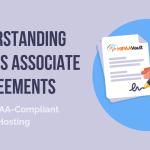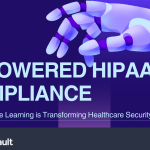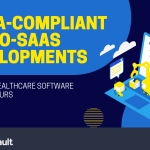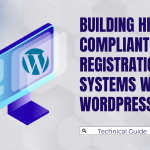
Are you navigating the complex world of HIPAA compliance? You’re in the right place! Let’s dive into the essentials of Business Associate Agreements (BAAs), HIPAA-compliant hosting, and best practices for healthcare software development. Buckle up – we’re about to make HIPAA compliance a whole lot clearer!
Understanding Business Associate Agreements (BAAs)
First things first: what exactly is a BAA? A Business Associate Agreement is a critical contract required by HIPAA when protected health information (PHI) is shared between covered entities and their business associates. But who’s who in this HIPAA compliance dance?
Who Needs a BAA?
- Covered Entities: These are the healthcare providers, health plans, and clearinghouses that directly handle patient information.
- Business Associates: This category includes anyone who creates, receives, maintains, or transmits PHI on behalf of a covered entity. Think software developers, cloud service providers (CSPs), and even marketing companies!
Here’s a shocking stat for you: In 2022, the healthcare industry experienced an average data breach cost of $10.1 million – the highest of any industry for the 12th year in a row. Yikes! This is why BAAs are so crucial – they help define responsibilities and protect everyone involved.
The Importance of HIPAA-Compliant Hosting
Now, let’s talk about where all this sensitive data lives. With 83% of healthcare organizations using cloud services as of 2021, HIPAA-compliant hosting has never been more important.
Rising Cybersecurity Threats in Healthcare
Remember that eye-watering $10.1 million figure we mentioned earlier? That’s just the tip of the iceberg when it comes to cybersecurity threats in healthcare. Hackers are getting smarter, and the stakes are higher than ever.
Cloud Adoption and Its Implications
Cloud services offer amazing benefits for healthcare organizations – scalability, cost-efficiency, and improved collaboration. But with great power comes great responsibility (and the need for rock-solid security measures).
Key Players in HIPAA Compliance
Let’s break down who’s who in the HIPAA compliance world:
Covered Entities: Healthcare Providers, Health Plans, and Clearinghouses
These are the frontline organizations directly handling patient information. If you’re providing healthcare services, managing health plans, or processing health information, you’re likely a covered entity.
Business Associates: From Software Developers to Cloud Service Providers (CSPs)
If you’re supporting covered entities by handling PHI, you’re a business associate. This includes:
- Healthcare software developers
- Cloud service providers
- Medical billing services
- IT support companies
- And many more!
Essential Components of a BAA
A solid BAA isn’t just a formality – it’s your roadmap for HIPAA compliance. Here’s what it should cover:
Responsibilities of Each Party
- Who’s encrypting the data?
- Who has access rights?
- What data can be disclosed, and to whom?
Data Security and Privacy Measures
This is where you spell out the nitty-gritty of how you’ll protect that precious PHI.
Choosing the Right HIPAA-Compliant Hosting Provider
Not all hosting providers are created equal when it comes to HIPAA compliance. Here’s what to look for:
What to Look for in a CSP
- HIPAA expertise (obviously!)
- Robust security measures
- Willingness to sign a BAA
The Importance of Technical Support
Good support isn’t just nice to have – it’s essential. You need a provider who’ll be there when you need them, keeping your data secure and your systems running smoothly.
Healthcare Software Development and HIPAA Compliance
Calling all developers! If you’re creating software for the healthcare industry, HIPAA compliance needs to be baked into your process from day one.
Best Practices for Developers
- Encrypt everything (seriously, everything)
- Implement strong access controls
- Regular security audits and updates
Common Pitfalls to Avoid
- Neglecting mobile security
- Overlooking physical security measures
- Failing to train staff on HIPAA requirements
Ensuring HIPAA Compliance in the Digital Age
As of 2022, 59% of healthcare organizations report having a comprehensive cybersecurity program in place. That’s great progress, but it also means there’s room for improvement. By understanding BAAs, choosing the right HIPAA-compliant hosting, and following best practices in healthcare software development, you’re setting yourself up for success in the ever-evolving world of healthcare data security.Remember, HIPAA compliance isn’t just about avoiding fines – it’s about protecting patient privacy and maintaining trust in our healthcare system. So, are you ready to take your HIPAA compliance to the next level? Let’s make it happen!





